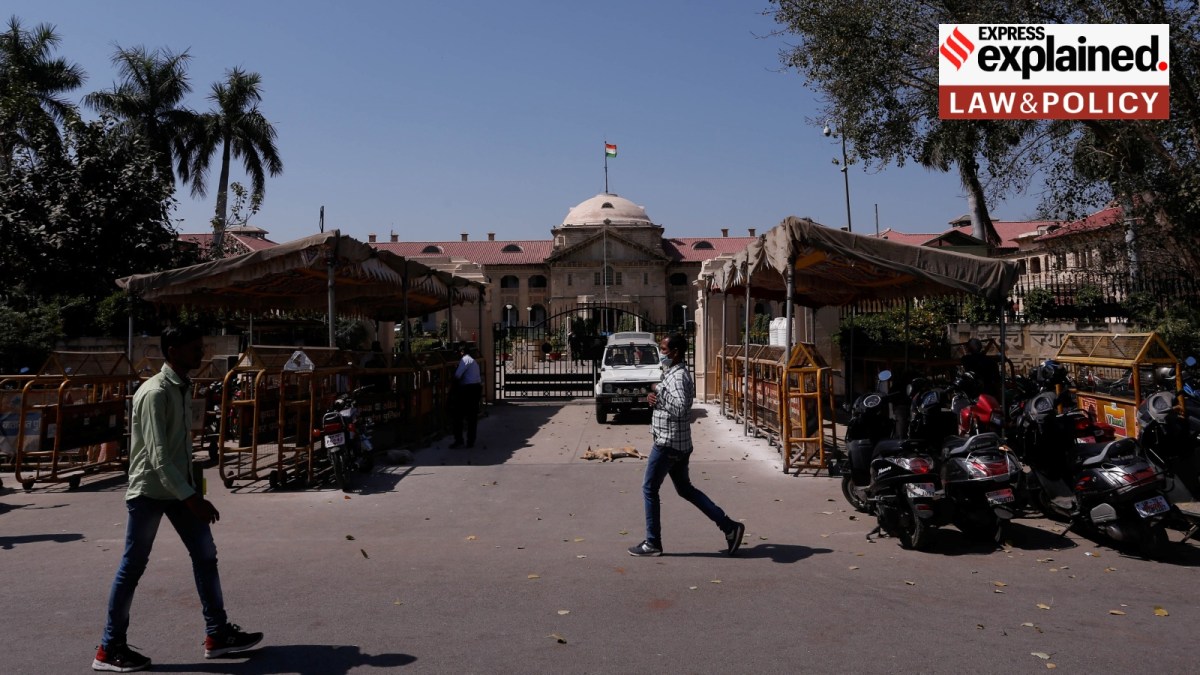How Uttar Pradesh’s anti-conversion law governs religious conversion
How does Uttar Pradesh’s Prohibition of Unlawful Conversion of Religion Act, 2021 prohibit ‘illegal’ religious conversions? What is the procedure for a valid conversion under the law?

The Allahabad High Court, on April 4, refused to quash an FIR against a Muslim man in an interfaith live-in relationship, citing Uttar Pradesh’s Prohibition of Unlawful Conversion of Religion Act, 2021. A bench of Justices Vivek Chaudhary and Narendra Kumar Johari observed that the UP anti-conversion law prohibits interfaith live-in relationships, and that the FIR could only be quashed if the couple got married in accordance with the law.
Here is how UP’s law punishes ‘illegal’ conversions, and what a valid conversion is under it.
‘Illegal’ conversion, and punishment it entails
In the current case, the court said that live-in relationships were “in the nature of marriage”, saying that “Section 3(1) of aforesaid Act, 2021 prohibits such living (live-in) relationship which is in the nature of matrimonial bond… hence, such residing of petitioners in relationship like marriage cannot get approval by the Court of law.”
Also, Section 4 of the law states that “Any aggrieved person” or their relatives (like in this case) can lodge an FIR for illegal conversion.
Those found guilty under Section 3 can be punished as per Section 5 of the anti-conversion law. The standard punishment is 1-5 years imprisonment, and a fine of at least Rs. 15,000. If the victim is a woman, a minor or a person belonging to a Scheduled Caste or Scheduled Tribe, the punishment increases to 2-10 years with a fine of at least Rs. 25,000. In cases of mass conversion, the punishment becomes 3-10 years, and a fine of at least Rs. 50,000.
For those who have already been once convicted of an offence under this law, up to double the relevant punishment may be provided imposed.
On the subject of conversion by marriage, Section 6 of the law also bars “Any marriage done for the sole purpose of unlawful conversion” and states that such marriages shall be declared “void”.
Procedure for valid conversion
The process for valid conversion is provided under Sections 8 & 9 of the anti-conversion law. This requires the person converting to submit two declarations to the District Magistrate — the first at least 60 days before the conversion takes place, and the second a maximum of 60 days after the conversion.
The first declaration must contain a statement that the individual wishes to convert their religion without any force, coercion, undue influence, or allurement. Further, the person conducting the conversion ceremony — the “religious converter” — must inform the District Magistrate one month in advance regarding where the ceremony will take place. The Magistrate will then ensure that a police enquiry is conducted to determine the “real intention” of the religious conversion.
The second declaration will include details such as date of birth, permanent address, father/husbands name, prior religion, religion to which the individual is converting, and the details of the conversion ceremony. After the second declaration is submitted, the District Magistrate will post a copy of it to the notice board, for the public to record objections to the conversion, if any.
The law also reverses the standard burden of proof in criminal cases. Under Section 12, the “person who has caused the conversion” must prove that it was not done on the grounds enumerated under Section 3(1).
Challenges to the law
A larger challenge to the constitutionality of anti-conversion laws passed by various states is pending before the Supreme Court. In 2020 the organisation Citizens for Justice and Peace (CJP) challenged the Uttarakhand Freedom of Religion Act, 2018 and the predecessor to UP’s current anti-conversion law, the Uttar Pradesh Prohibition of Unlawful Conversion of Religion Ordinance, 2020.
CJP has since challenged the UP anti-conversion law as well as similar statutes in Himachal Pradesh, and Madhya Pradesh. They have also filed a petition to transfer all the challenges to similar laws that are pending before High Courts across the country so that the Apex Court can decide them all at once.
While the SC case has been pending, challenges have also been filed against the UP anti-conversion law at the Allahabad HC. Dr Rajendra Bihari Lal, Vice-Chancellor of the Sam Higginbottom University of Agriculture, Technology and Sciences, was accused of being involved with the mass conversion of 90 Hindus to Christianity in 2022. In 2023, Dr. Lal and 7 others challenged Sections 3, 5 and 12 of the UP anti-conversion law, though the High Court refused to stay the law in June 2023, stating that the provisions were not “glaringly unconstitutional”.